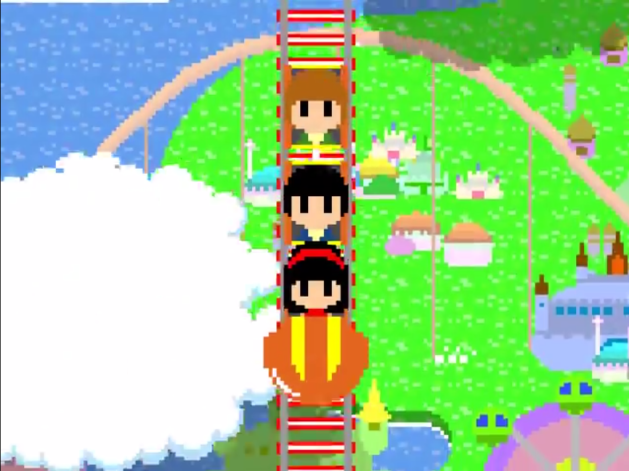
It had been a year or so since I last wandered along Meiji street in Shibuya, Tokyo. As I walked across the pedestrian overpass from Shibuya station on that unseasonably overcast May evening, I methodically repeated the interview questions in my head. YMCK is one of the most prolific chiptune groups around, and they had agreed to meet me at a small cafe in Tokyo for an interview. Waves of nerves and excitement rushed over me all at once, creating an inner chaos of introspective-induced adrenaline.
In 10 years and with 5 albums, YMCK has cemented themselves as one of the most recognizable names in chiptunes. A group that has even found popularity outside of the niche chiptune scene, writing 8-bit remixes for Katamari Forever, PiCTOBiTS, and even tracks for the television show, Yo Gabba Gabba!.
I paused briefly at a window display for a restaurant, looking over an encasement of ornately arranged plates of plastic glazed food items on wooden shelves. Curry, yakisoba, and katsu pork cutlets all bidding for my business. As I started my stride back down the street, I realized I had already made it to the cafe. A wooden sidewalk sign tucked in between an array of other shop’s signs read: Cafe Croix, 8th Floor. WiFi Available. Dogs Welcome.
As I began making my way upstairs to the 8th floor, I wondered if anyone would be there yet and how I would recognize them. Avoiding the typical rockstar attitude, YMCK prefers that their photos not be taken, typically insisting on using their 8-bit likenesses instead.
8th floor, the very top. I make my way into the cafe and strategically to a booth in the back that over-looked the cafe and, especially, the door. A gauntly 20-something man meandered out from the bar and over to my table to take my order. After ordering my beer I heard my name shyly said by a wistful and bright voice somewhere behind me. If I knew anyone from the few photos I’d seen, it had to be Midori Kurihara — YMCK’s bubbly and captivating vocalist. She smiled brightly at me before we stood, wearing a Mario star hat as a way to get my attention.
I picked up my bag and moved to the table behind, the furthest from the bar next to a large window overlooking Meiji street; the Shibuya skyline engulfing my view. Midori’s band mates Tomoyuki Nakamura and Takeshi Yokemura arrived a short while later, politely bowing as they made their way over to our table, and it was finally time to begin our interview.
I took out my voice recorder and placed it in the middle of the table.
In a music scene that’s only around 20 years-old, it’s pretty amazing to find a group that’s sustained for half that. “It’s your 10-year anniversary this year,” I say in my best, rusty Japanese. “How does it feel to have made it such a long time?” Midori smiles and looks over to Tomoyuki, “It has been a long time.” Tomoyuki smiles back, “Time flies. We’re pretty surprised.” Midori nods, “It is kind of surprising. [Early on] We performed in other countries, and one of the biggest music festivals in Japan. But in the beginning, we had no plan.”
Having played in over 8 countries, everywhere from the U.S., to Sweden, to Taiwan, to France, surely the group has witnessed some substantial changes in the scene.
“How do you feel the chiptune scene has changed, particularly in Japan, over the past 10-years you’ve been in it?” I asked as Midori and Yokemura take a sip of their beers.
“We think it’s still too niche at this point to have changed a lot,” Tomoyuki answers stiffly. “Well, it has some,” Midori chimes in. “They might not know the older games or have played them, but they still enjoy making chiptunes music.”
Tomoyuki follows Midori’s lead, adding, “The newer people haven’t played Famicom as it came out but they still enjoy it, and making the music.”
“You’ve been playing almost your whole lives, I suppose,” I glance down at the question sheet in front of me. “What games have influenced your style?” Tomoyuki lights up, “For me, the biggest influence is Ice Climber. It has a jazz flavor, it’s my favorite.”
“Metroid,” responds Midori. “The first time I cleared the game and saw the ending, I cried. The ending music was so moving.”
The quiet and reserved Yokemura shyly looks over his beer, “Nemesis.”
To preemptively guess, any chiptunes group or artist surely must relate the NES, or Famicom in its native Japan, as their favorite system. But, I had to ask. “What about consoles, which is your favorite?”
Tomoyuki assuredly answers, “Famicom.” Midori nods in agreement, as though it were the obvious answer, “Me too.” Yokemura takes another swig of his beer and softly answers, “Genesis.” I release a quiet sigh of relief after I had begun to feel I had asked an all too obvious question. Tomoyuki smiles, looks over at Yokemura, and back at me, “He’s 16-bit.”
My nerves begin to work up again as I muster out the next question, “Which of your songs do you enjoy performing live the best?”
Midori lights up with her bright white smile, “We make a start-up movie for every live performance. That is the most fun for me. I can see it from the side of the stage, and the audience sees it and gets all excited. I love that moment.”
“I don’t really have any especially,” explains Tomoyuki, “but currently we have a new song called Colorful. During this song Takamura plays a shooter game real time, and that’s really fun.”
My next question feels generic, but the truth is I wonder what music a chiptunes group like YMCK would find inspiration from. “What other bands have influenced you over the years?”
Surprisingly, Takamura is the first to answer, “The Beatles.” Tomoyuki looks up and begins to list off on his fingers, “First it’s pop music, 80’s from UK: Duran Duran, AHA, heavy metal, Metallica, Gun and Roses, jazz — lots of influences.”
“It’s a difficult question,” explains Midori. “I don’t have a band, but when I was a child I learned the organ, and my dad played the bass, so he really influenced me.”
“It’s been quite a long journey over these last 10 years,” I boisterously exclaim. “Where do you see YMCK in the future?”
Midori chuckles, “Superstar. Becoming superstars.” Tomoyuki looks more sternly, quickly changing the table’s mood, “I think after we finish contracts with companies and we have freedom we will experiment more, and become much more creative.”
“You have a significant amount of American fans,” I explain. “Is there anything you’d like to say to them?”
Midori cheerfully replies, “I’m so happy American people like our music! This new CD is released in America, so I’m glad we have so many fans there.”
“I am the same,” nods Tomoyuki. “I’m glad there is a large audience of American fans.”
“If you could give chiptune musicians any advice, what would it be?” Tomoyuki lets out a small laugh and exclaims, “I want everyone to make more songs!” The group giggles politely, and Yokemura adds, “There should be more vocals.” Tomoyuki nods, “I’d like to hear more vocals as well.” Unlike most chiptunes groups, YMCK adds vocals to almost every song they write. Midori’s soft, cheerful voice aiding each song’s uplifting sound.
“I would like them to just make music instead of rules,” states Midori rather stoically. “There are too many rules for chiptunes, for example some only use so many sounds at once. Forget the rules and just make music.”
After we said our goodbyes and I rode the train back to my hotel, I couldn’t help but think how surreal the entire experience was and how I will always remember that one night in Tokyo.
Interview conducted by Justin Ludeman on location in Tokyo, Japan; compiled and edited by Jennifer Leach. Special thanks from Another Castle to YMCK and Justin for making this all possible.









Reblogged this on Rice Cakes.